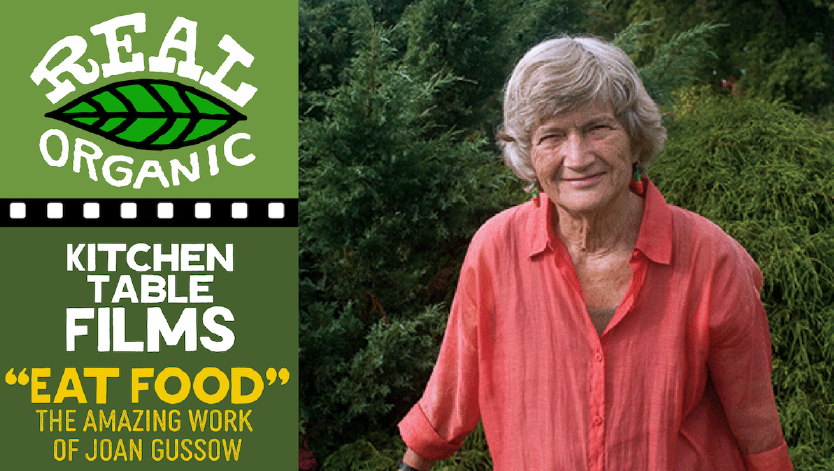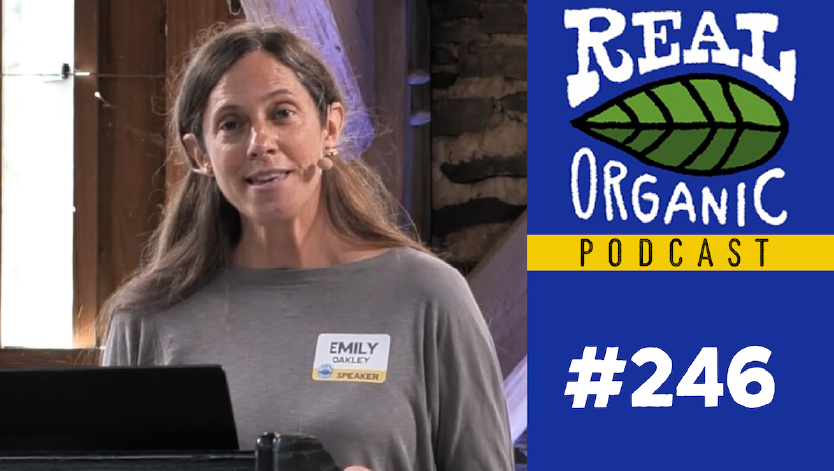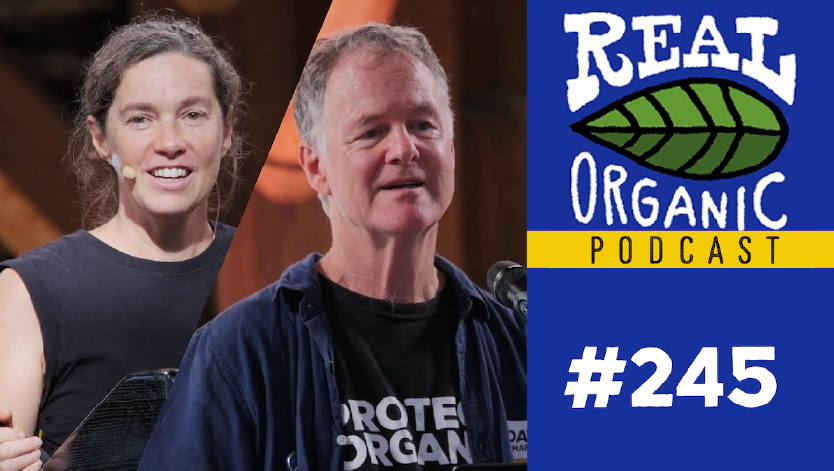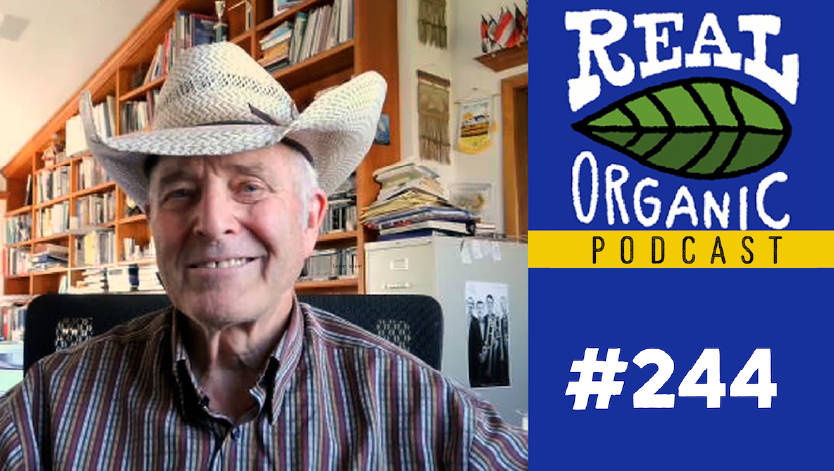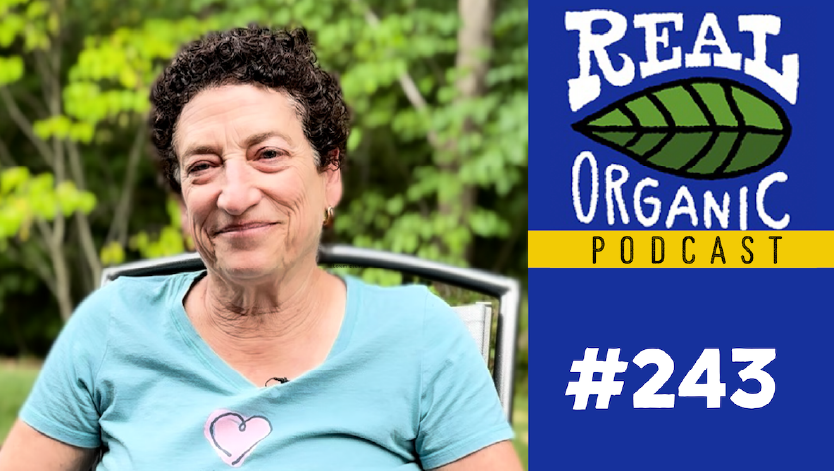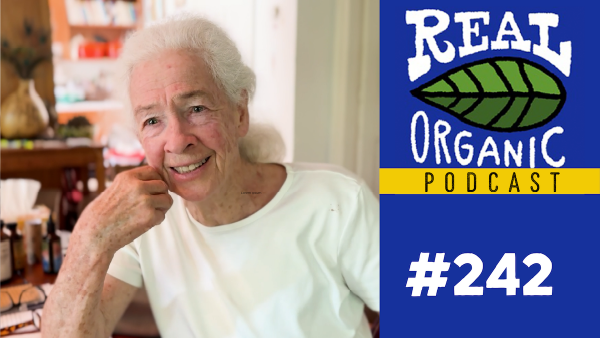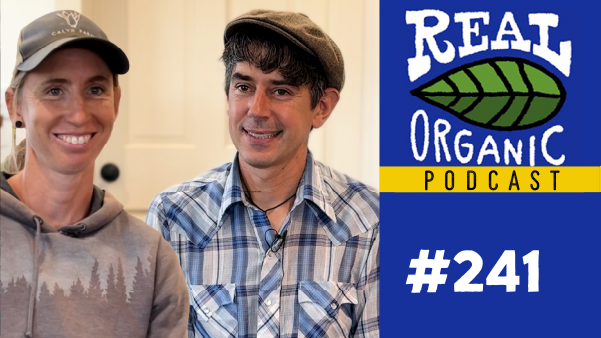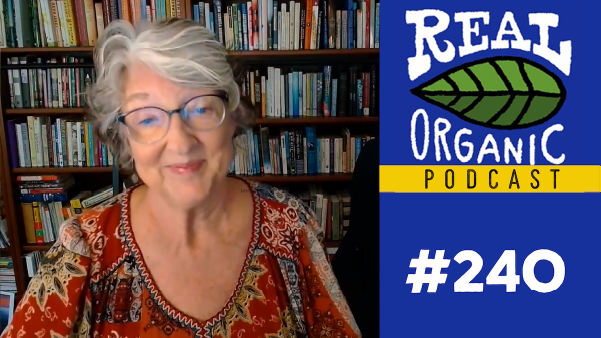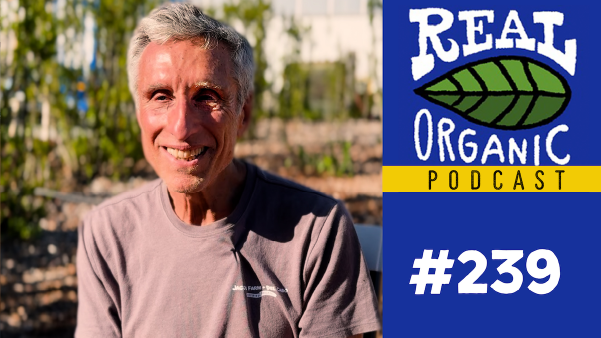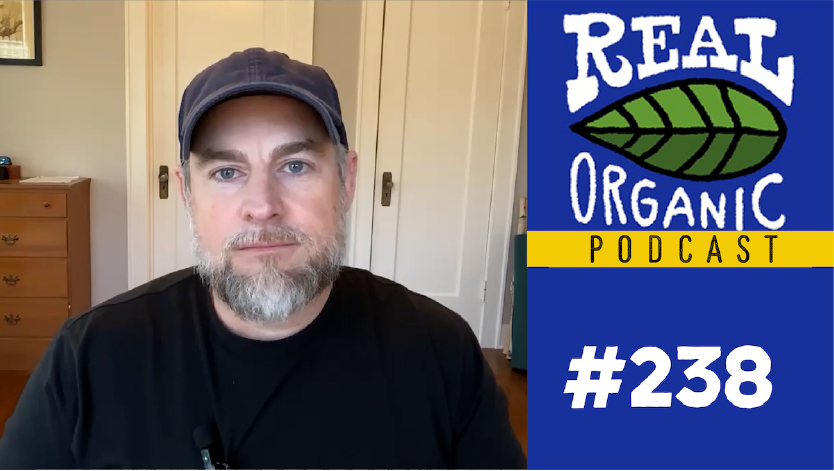Episode #209
Nora Taleb at Churchtown: Farmer-Led (R)Evolution
Welcome! You can subscribe and download episodes of our show through your favorite podcast app.
You can also subscribe to receive the video version of each episode on our YouTube channel.
Nora Taleb’s talk from Churhctown Dairy in Hudson NY was filmed before a live audience of farmers, thinkers, and food systems folks:
Nora Taelb delivers her talk “Farmer Led (R)Evolution” to the crowd gathered at Churchtown Dairy on September 28, 2024, for Real Organic: A World Movement:
Linley Dixon 0:00
Our next speaker is Nora Taleb. We met serendipitously because of a canceled conference in Germany, and she said, Come to NATURLAND. Come see the way we do things. It’s really similar to what’s going on with you all, with the real organic project, with farmers leading the standards and the importance of that. Nora, thank you. I need
Nora Taleb 0:55
So great to be here, so excited. So during this conference, I was asked a couple of times how I found my way into the farming movement. So I’m going to tell that story now. By the age of 21 I was a human rights activist who had fallen in love with nature, and I was ready to save the world as you are when you’re 21 not really. But I felt the field that had the greatest potential to solve all humanity’s problems was farming and our globalized food system, because it connects all of us, and it connects all of us to nature.
Nora Taleb 1:30
It is within the context of farming and food production that we negotiate climate change, biodiversity or the extinction of species. Here, geopolitical power, social inequality and also our relationship to the more than human world I defined, and obviously farming is what nourishes our life. I pretty soon realized that one leverage that seemed to be pretty important was smallholder farming.
Nora Taleb 1:58
So I was really excited about working to support small scale farmers. I just needed this first experience working and living with smallholder farmers in northern Argentina to get a better understanding of what they actually needed there. I worked in a subdivision of the agricultural ministry in different projects around measuring rules sustainability in the river valleys that came off the Iguazu waterfalls, and we worked on building local market infrastructure for farmers to show a pathway out of the toxic tobacco industry. And here, I learned that what farmers really needed the most was A community and B infrastructure.
Nora Taleb 2:41
Obviously, in particular market infrastructure to get products to the market, but also to get access to means of production, which is something that a lot of small scale farmers achieve through the cooperative model. For example, upon returning to Germany, I joined an international farmer association that worked on both creating community for farmers and developing infrastructure, and that organization was NATURLAND.
Nora Taleb 3:07
NATURLAND is one of these large, European based, Farmer led organic associations that were founded in the 80s, and actually at that time, the development of the organic market in the US and Europe had taken similar terms, because it was really the farmers who started to build the movement and started to build the market and started to build first standards and certification mechanisms, not not in order to have standards or to work on certification, but because certification and standards were a tool to broaden a way of life and a vision from the farms to a broader public and engage more people into the movement so that they could buy certified organic products from trusted source.
Nora Taleb 3:52
So NATURLAND, like some of the other farmer led organic associations and certifiers in Europe, we’ve always worked on developing standards. Until today, we still develop new standards, and there’s a lot of innovation still coming out of these associations, like the certification of Organic Aquaculture or certifying insects. For example, we’ve been developing and upholding a parallel quality assurance and certification infrastructure next to the EU organic certification system, we worked on public political representation of farmers in front of policy makers. We do trainings and capacity buildings for farmers.
Nora Taleb 4:35
This is also something that I was involved in to train them and support them with farm practices everywhere. So there’s more than 100 agronomists working for natolin that are out on the field with the farmers from day to day, we build bridges to the civil society in its to educate about the reality of farming and not just paint a pretty pink picture. But to really show what farming is like and what it looks like and what is important that all of this was done through a farmer governance structure. So every important decision was taken by the assembly of delegates and the board of directors who were 100% farmers.
Nora Taleb 5:18
So to give you a few more numbers, in Germany, 11.8% of farmland is farmed organically, and from that 11.8% 64% are members of an organic farmer association that farm according to their own certification programs. So this would be like if 64% of organic farmers in the US joined ROP, just to give you an image. And so within atulant, there are 200,000 farmers worldwide, actually that farm that are part of the association and farm according to the standards, and they are really everywhere across the globe, in more than 60 countries, and 1400 partners from processing brands, CPGs, retailers, are also part of the network. They get certified and are part of the program as well.
Nora Taleb 6:12
And Naturland has a lot of differences in the standards to the EU organic regulation. So social responsibility has always been a built in pillar or looking at coffee or cocoa production. For example, those products had to come from agroforestry systems, as opposed to monocultures. Cover cropping, for with nitrogen fixing, cover crop, cover crops to as green manure, is an obligation animal husbandry had stricter requirements regarding animal welfare, transportation, slaughtering.
Nora Taleb 6:48
So the point is, the farming associations that also certify they could really build into the standard whatever they felt was appropriate, and it was never hard for the eaters and the society to understand that there’s a difference and that that this mattered, because those movements were kind of civil society movements that had grown over the decades. So I was in my third year into the into the job, I think when I received the assignment to look into the US market. Why? Because from those 120,000 farmers that were part of the association, actually many of them sold to the US and also a couple of brands.
Nora Taleb 7:30
But in the US, this was, I guess, in 2018 there were no organic add on labels. So this was before ROP had launched the label or the regenerative organic certification program had launched, and we knew that there were brands interested, CPG, brands in America that wanted to communicate the extra mile that they were taking and wanted to go beyond USDA label, but they didn’t have an option at that time. So it wasn’t just that we said we want to go there, but it was actually companies approaching us. Can you do something? Is there something you could do in the US? Maybe.
Nora Taleb 8:07
So I looked into it. I went on market research trips to Expo West, and I spoke to a lot of people, but it seemed really hard, like, like an impossible job to introduce the idea of an add on label, because that concept was not like known to people at all. So I remember pretty well one day, as I was sitting in Germany, thinking How the f I was going to do this, because this is never going to work.
Nora Taleb 8:35
I came across this news fit or newsfeed that said, Dr Linley Dixon was traveling to Brussels to speak to EU commissioners about the hydroponic issue. So I immediately started Googling, who this Linley Dixon was, what the Real Organic Project was, and what’s the deal with the hydroponic issue. Because working for three years in the organic movement, hydroponics has not really appeared on my radar. I wasn’t aware, aware that this is an issue.
Nora Taleb 9:03
So I remember that hearing and finding out about the real, organic project was so exciting to me, also because of what they did, but even more so because of who they were as people. So I invited Linley to come over. She I’m looking there, because she’s sitting there. She came to Munich. We went on farm trips, and we started talking. And from that experience, really a relationship grew. And what followed were many zoom calls with Dave Chapman and Linley, who are still until today, the leadership team of the Real Organic Project, together with the board, obviously.
Nora Taleb 9:42
And we started exploring, what if we created a process, a brand, retailer, standard and certification procedures that would extend, extend our peace reach, from working with farmers and fresh produce to including more products and ingredients and allowing. Move more people into the movement, besides farmers. What if partnering up, we could immediately hire a larger quantity of certified raw ingredients and products, which is something useful if you want to create market pool. What if partnering up, we could learn from one another and hold each other’s hands in this, in this project?
Nora Taleb 10:23
So our idea was to create a joint venture which, which we did, where all ingredients that were available from North America could be sourced from North American farms, and all ingredients that were not available, like cocoa, vanilla, tropical fruits and coffee tea, could be sourced from Naturland Farms. And there we were figuring this out, and to us real organic project was really an opportunity to ground within us society and the US market. They were still a very young movement, but with huge potential to them.
Nora Taleb 10:59
I think we were hope, hope that all of this could actually make sense, hope that the European community could support them. To me, they became teachers and leaders I looked up to in those years I spent working with Linley and Dave, I learned more about the North American food system, the past and the present than I ever could have found in any textbooks.
Nora Taleb 11:24
Actually, three years ago, when I had my first child, I decided that it was time for me to move on. So I don’t work with Naturland in this project anymore, but I’m just so grateful for this time that I was able to spend with them, and it really made me into the person that I am today.
Nora Taleb 11:42
And it was beautiful to see how, for Linley and Dave, it wasn’t hard to imagine that real, organic project could be an international movement. Maybe it already was an international movement. And this is how, this is how everything started with our partnership, really.
Nora Taleb 11:59
And I remember in our partnership negotiation, when we were still trying to figure this out, there was one specific instance when the label issue came up. So some of you will remember this is what it looked like when the Real Organic Project started as a social movement, really. So I remember that the ROP leadership had just decided that actually they were going to go through with creating their own add on label, because all the other things that have tried before have not had the results that they were hoping for, which was changing the law and changing the way how certifiers would certify in the US.
Nora Taleb 12:35
And I have to admit, I had some anxiety around the label issue, because not everybody was in love with the term real, organic, as you can imagine, and some of you may remember, but if our partnership negotiation was successful, this label would also be representing us and the 1000s of farmers that we stood for. So it was really important to us, and I felt we needed a marketable name. There was a tiny time window in which the ROP leadership had decided yes, they were actually going to create a label, and that label being designed and trademarked.
Nora Taleb 13:10
So I made up my mind I was going to outsmart Linley and Dave, that’s what I thought. So I hired a designer. I came up with a bunch of fancy sounding label names. We even had one of them checked for trademark registration in the US. I did all of this behind your back. I’m sorry. So I was super well prepared. I went into this meeting, I was so excited, and I was convinced that we were gonna land on a super likable name that’s not gonna piss off a lot of people. So you know how this story ended.
Nora Taleb 13:43
They wouldn’t, but I’m making this sound easy now it wasn’t, wasn’t that that decision wasn’t an easy decision for them to take. But you know what you would think that I was disappointed the day that I presented, and they said, “No, Nora, it’s got to be real organic.” But I was actually not disappointed that very moment they said, No, I was able to release my anxiety, because that day, I again remembered that this is a movement of the people, and questioning their name was like challenging who they are and who they were becoming as individuals and in community. This wasn’t about marketing. The real was the most authentic representation of who they are, because a word is not the same thing as a name.
Nora Taleb 14:34
This was not just about what are we talking about? This was who is talking to them. The Real Organic Project was deeply personal.
Nora Taleb 14:43
Rememberthose pictures from the first rallies? I wish I had some of them here, but I didn’t include them. These people were not scared of being seen and standing up in public for something they deeply cared about, and they made some noise, and not everybody liked it. I. I think it takes tremendous courage to speak up about something that actually your own livelihood depends upon.
Nora Taleb 15:09
The word courage stems from the Latin word cur, which actually means heart, and this is different from bravery running into a battle with a sword. Courage means to tell the story of who you really are with an open heart, telling someone stop You’re hurting me actually cracks you open. It is admitting your vulnerability to someone who potentially has the power to harm you.
Nora Taleb 15:34
And this is what they did, because our increasingly industrialized and consolidated food system is putting small farms out of business every day, and not just in the US, but everywhere. And this is not my opinion. This is a fact, besides all the semantic argument that is going on right now of people trying to take authority to define what organic, regenerative, sustainable, Climate Smart Agriculture truly is.
Nora Taleb 16:05
What if this real is not about an authoritative argument of right and wrong? What if this real is showing up as who you are and being courageously vulnerable about it, looking into academic research, the official definition of vulnerability is this, uncertainty, risk and emotional exposure. It’s the question, are you willing to show up and be seen when you can’t control the outcome?
Nora Taleb 16:35
This is by Brene Brown, who’s one of the, or IS the most famous researcher on vulnerability until today, so she says that vulnerability is waiting for the doctor to call after your mammogram, or vulnerability is saying, I love you first. It’s the uncertainty of daring greatly if success and rewards are not guaranteed.
Nora Taleb 17:01
Many times I heard Linley and Dave say, we don’t know if this is going to work out, but we have to try anyway. The truth is, Brene Brown didn’t research vulnerability. Vulnerability was something that came out of her research. She was actually researching connection, and it turned out that vulnerability is a precondition.
Nora Taleb 17:24
So being able to experience vulnerability is a preconnection to being able to experience connection. And connection really is at the heart of our human existence. It’s the desire to care for someone, to be cared for, to experience love and belonging. And I think this is what we all strive for, right? So vulnerability and connection, together with courage and compassion, is the mix that Brene Brown found out to be the cocktail for outstanding leadership.
Nora Taleb 17:59
Farming is one of the most vulnerability prone professions you can choose. Even the best farming practice can’t save you from a drought, a flood, a hurricane, farmers are in public display for the for the for the public to judge them. 24/7 basically, as we are all standing here in this room, strategizing and thinking about the future of farming, we are not alone the vulnerability of our global farming system has reached the global political agendas everywhere, multinational corporations, large scale farming systems, monocultures, are aspiring to become more sustainable. And I think this is really good. We need this. We have to transform the way we farm on large scale, and small improvements on a large scale can already have a tremendous positive impact.
Nora Taleb 18:46
And I think I’m really or I’m really grateful that a few sustainability experts, policy makers, investors, tech companies have taken up the challenge to transform large scale Corporation owned farming systems. But I think it is worth mentioning that as large scale and cooperation on farming systems become sustainable, become more sustainable, they are further improving their competitive advantage, because they cannot only produce large quantities efficiently at a low cost, they can now also do so sustainably, regeneratively and organically certified.
Nora Taleb 19:26
But here’s the thing, these farm owners or shareholders of stock traded companies, their lives don’t personally depend on this. So wait, large scale farming systems get more sustainable, and all what we get is vulnerability like, how is that a good thing? It’s true. I think the vulnerability of the small scale farming system, or the small scale farmer is really the Achilles heel of our global agri food system. I. Because this is about our food sovereignty. And food sovereignty and food security is not the same thing.
Nora Taleb 20:08
I hear sometimes people confusing that, because food security is something that technically, the UN can help us with through UN food aid programs or Bill Gates wants to help us with that, but food sovereignty is the right of people to healthy and culturally appropriate, appropriate food produced through socially just, ecologically sound and sustainable methods and and I think this is the really important part there. I’m sorry. I’m going to read here, um and their own policy strategies and systems of food production, distribution and consumption, and only entrepreneurially led farms that depend on locally adapted, rooted knowledge with independent means of production and selling infrastructure have the capability to gift us all food sovereignty.
Nora Taleb 20:59
This is not just about the farmers. This is about all of us. And sometimes I think this is so easy to understand that by dispersing structure, we reduce risk. This is actually what you learn at Wall Street, I guess. And Germany, we call this clumping risk. So I have a really hard time to understand why people who are who are into making big money. Don’t understand this correlation. So how can our vulnerability, though, be potentially a good thing? I think actually vulnerability is not only a good thing, I think it’s probably the eye of the needle to healing.
Nora Taleb 21:38
But here’s the thing, only few of us can thread that yarn through the needle eye, because the thing about connection, you remember that thing we all strive for, you actually have to need it to get it. In school, I studied, or I learned about the rise of the German welfare state. In the 19th century, we started to outsource social services like childcare, caring for the sick and the poor and the elderly, first to the churches, then, in the 20th century, to the state, and later on, to the private sector. So we are paying for other people to take care of us, basically, so that we can work more. I guess. I guess this is how the money system works, and we are. We are doing pretty well as a society.
Nora Taleb 22:29
But whenever I lived in countries that had less developed social security systems, the level of care and support among the people was more developed because people actually needed one another in order to thrive, sometimes to survive. And I don’t mean to glorify poverty here, obviously we all need a certain level of social security and economic stability, but I’m just saying that as countries grow richer, we become more disconnected and lonely, and so we are disconnected, also from our food.
Nora Taleb 23:07
This is AI generated artwork by Philip pilatvikovic, a world where everything is grown, not made. In most cases, food consumption is not embedded in the ecosystem and communities. It originates from food processing really changes the original image and creates a new identity for the raw material, creating food from nowhere that was produced by somebody we don’t know is the status quo we think is normal, but never think about we are personally and geographically disconnected from the food we eat.
Nora Taleb 23:39
In addition to geographic and personal disconnection from food, there’s also a time delay, so food gets grown and harvested much earlier in time then we get to eat it. And all those three things, disconnection from place, disconnection from the people, and disconnection from time, is what allows us to uphold degenerative food systems, because what is remote to us is easier to exploit.
Nora Taleb 24:08
But we are now all seeking to evolve, not only our food system, but actually our global economy, because our extractive business models we’ve been working since colonialism are not working anymore. Actually, they have never worked, but now systems are really breaking down, and people wake up. So as a society, we don’t know how to build economic wealth in service to life. We are learning how to do that. We are taking baby steps, and there’s a lot we need to unlearn. The challenge with unlearning is that for many people, sustainability is a luxury, and then for some sustainable practices, regenerative practices, organic practices, are a necessity, because some of us actually really depend on the viability. And regenerative capacity of the living systems they are a part of.
Nora Taleb 25:04
Look around you in this room, there’s many of them here. There are people who’ve built successful businesses not based on extractive models and high chemical inputs. They have built systems that leave the food sheds and the watersheds better than how they have found them by regenerative, by regenerating the system’s capacity to reproduce and regenerate itself. So connection, vulnerability and dependency are connected. They somehow relate to one another, and they are part of our healing journey, I’m sure.
Nora Taleb 25:40
So the question is, really, how do we evolve our mostly degenerative food system into a system that nourishes all life? How do we create connection embeddedness and vulnerability when we think we don’t need it? I don’t know about you, but I feel pretty good walking this path together with people who understand the cycles of life and the energies of interconnection.
Nora Taleb 26:09
But I also don’t want to leave this stage without challenging, challenging you a little bit. So this is something that I’m now personally trying to figure out myself. How do we evolve the whole system, and not just one organic niche or niche. You say, I think, and I also don’t know the answer to that, and I just want to say that if this question makes your heart cringe, if you feel the weight on your shoulders of having to change an entire system, if you feel like you need to fight the Giants and correct their wrongs.
Nora Taleb 26:42
Let me tell you, I think you can do a better job than that, because whenever we go into fight mode, we are alienating ourselves from our opponent. I’m right. You’re wrong. Shut up. This is the place where radicalism, polarization, blame and shame are born. Whenever you want to fight the dominant system, you’re denying your interconnectedness with that system. And I think we, particularly we can do a better job than that. So I’m offering you a small alteration of the sentence, and I’m still working through this myself, trying to figure out what to do next.
Nora Taleb 27:18
How do we co evolve with the system, the whole system, everybody that we are a part of, and not just one organic niche. So if you’re a farmer, a food activist, a journalist, an investor, maybe you want to start thinking about your role. What is your role in the system, and how can you help nourishing the regenerative capacity of the system. It’s like feeding this all first. This is what we’ve been talking about this whole weekend. Yeah, so today, I didn’t choose to talk about vulnerability and connection because I thought it was a smart thing to do. I chose that topic because leading from an authentic place of caring for this world, showing up as who you are, being vulnerable with each other, and seeing the world as alive, dynamic, changing and beautifully unpredictable, is something that I’ve learned.


